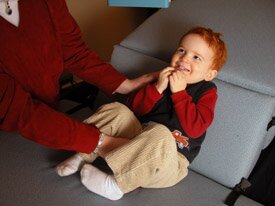| NKY WEATHER NOW |
More NKY Weather |
| Brought to you by: |
|
|
| NKY TRAFFIC NOW |
| Powered by: |
|
|
|
|
||||
 |
 |
|||
| Home | NKY News | Freetime | Travel | Homezone | Cars | Shopping | Working | Classifieds | About NKY | About Us | Contact Us |
|
Archives: Health
New Autism Treatment Option Available in NKY
FORT MITCHELL Of the 14 signs and symptoms of autism, Andrea Wrenn's 18-month-old son, Alex, had 10.
But what she did next is just the sort of thing a devoted mother does. She launched into an all out, no-stone-unturned search for every of bit of information she could find on autism, and when all was said and done she and her family were on a plane to Boulder, Colorado. Autism is a complex developmental disability that typically appears during the first three years of life, four times more prevalent in boys than girls and knows no racial, ethnic, or social boundaries. Autism impacts the normal development of the brain in the areas of social interaction and communication skills. Children and adults with autism typically have difficulties in verbal and non-verbal communication, social interactions, and leisure or play activities. The disorder makes it hard for them to communicate with others and relate to the outside world. On that premise, Bolles founded the Sensory Learning Institute in Boulder. The concept behind the program is to provide supplemental therapy to individuals children and adults who exhibit broad range of developmental issues ranging from Autistic Behaviors, ADD/ADHD, ABI, Developmental Delays, and Behavior problems. "One mother can turn a whole state on," says Bolles about the efforts that mothers like herself and Wrenn have put forth to find treatment for their children. At her Sensory Learning Institute in Colorado, she has worked with clients from as far away as Ireland, the Netherlands and Turkey. Each family found its way to her through its members' own research. Bolles says the multi-sensory program her program utilizes has long-lasting effects. "You don't see the benefits falling away. The gains the children make they keep. They build on these gains," Bolles says. She believes that the Sensory Learning approach allows for a significant change in some children which allows things in other therapies they're receiving to be more successful. Wrenn found that she clearly had a client base in Northern Kentucky when they held a seminar at the Drawbridge Inn in Fort Mitchell and more than 400 people attended. Those numbers, Wrenn says, indicate a definite need in the area for the type of supplemental therapy their program offers. Kristin Cuissot's 8-year-old son Wyatt is certainly among those with such a need. "I'd had him in stuff since he was a 4-month-old, but no one knew what he had," Cuissot, of Burlington, says about Wyatt, who was diagnosed just two months ago with Partial Trisomy 8, a chromosome disorder so rare that he is one of only two in the world with his specific diagnosis. "It was just a fluke," she says. Since his treatment at Sensory Learning, Cuissot has noted a measurable improvement. "It's amazing the difference in him. He's aware of everything around him. Before he was kind of in his own world," Cuissot says. Wrenn emphasizes that there are numerous elements to keep in mind when exploring treatment options for autism. Diet is considered one important piece of the puzzle. For instance, she says there are appropriate yeast levels in the body, which generally range from 0 to 40. Alex's levels were at 154. Working with the Doctors Dr. Robert Evans, a general pediatrician in Cincinnati, stresses that early intervention is key in the treatment of developmental disorders, particularly autism. "In the second year of life is when you notice a regression or progression in development," Evans explains. "What I noticed was that the earlier you can diagnose them and do therapy with them the better off they are," Evans says. "The problem I found was that access to therapy was slow. It's driven by the insurance companies and if they pay they might only give you 20 visits." Once those limits are met, Evans says, the issue for finding treatment is put back into the parents' hands. He says parents need to know about alternative and supplemental therapies. "I think it's fascinating," Evans says about the type of therapy offered at Sensory Learning Center. "If you can do that in conjunction with conventional therapies you can really have an impact," Evans says. Bolles points out that the program incorporates the work and disciplines of various health professionals such as MD's, osteopaths, optometrists, pediatricians, physical therapists, and occupational therapists. The cost of treatment at Sensory Learning Center is $2550, which breaks down to $85 a day for the 30-day program. Wrenn encourages potential clients not to be discouraged by the cost. She said her church, the First Church of Burlington, was instrumental in helping pay for Alex's treatment. She's currently working with a finance company to help clients cover costs. She also points out the center accepts credit cards. For information about Sensory Learning Center of Northern Kentucky call 859-344-8181, or .
|

|
|
Home | NKY News | Freetime | Travel | Homezone | Cars | Shopping | Working | Classifieds | About NKY | About Us | Contact Us Copyright © 2004, Challenger Communications, LLC, Covington, KY, USA
|

